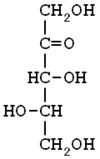Xylulose
|
|
|||
| Names | |||
|---|---|---|---|
|
IUPAC name
(3R,4S)-1,3,4,5-Tetrahydroxypentan-2-one
|
|||
| Other names
threo-Pentulose
threo-2-Pentulose |
|||
| Identifiers | |||
|
5962-29-8 (D/L) 551-84-8 (D) 527-50-4 (L) |
|||
| 3D model (Jmol) | Interactive image | ||
| ChEBI |
CHEBI:17399 |
||
| ChemSpider |
20892 |
||
| PubChem | 22253 | ||
|
|||
|
|||
| Properties | |||
| C5H10O5 | |||
| Molar mass | 150.13 g/mol | ||
| Appearance | Faint yellow syrup | ||
|
Except where otherwise noted, data are given for materials in their standard state (at 25 °C [77 °F], 100 kPa).
|
|||
|
|
|||
| Infobox references | |||
Xylulose is a ketopentose, a monosaccharide containing five carbon atoms, and including a ketone functional group. It has the chemical formula C5H10O5. In nature, it occurs in both the L- and D-enantiomers.
L-Xylulose accumulates in the urine in patients with pentosuria, due to a deficiency in L-xylulose reductase. Since L-xylulose is a reducing sugar like D-glucose, pentosuria patients have been wrongly diagnosed in the past to be diabetic.
...
Wikipedia

